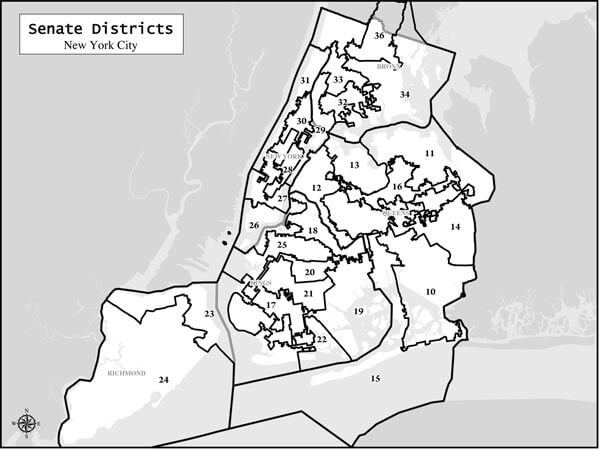By Joe Anuta
The contentious redistricting process that changed political representation in Queens came to a close Monday when a federal judge signed off on the new congressional lines, days after Gov. Andrew Cuomo did the same at the state level.
Queens lawmakers from the state Assembly largely voted to approve the state lines, while those from the state Senate unanimously opposed it.
A panel of judges overseeing the congressional lines approved the plan drawn up by the magistrate judge, Roanne Mann, with little changes.
Reaction to the state and congressional maps was drastically different, with independent groups and elected officials blasting the state lines as gerrymandered to keep Senate Republicans in power, while praising the congressional lines drawn by a court-appointed judge as fairly drawn.
“The bad guys won,” said Sen. Michael Gianaris (D-Astoria), who led a call for the process to be taken care of by an independent commission.
Gianaris was part of the group of Queens lawmakers in the Senate who opposed the legislation and even walked out of a late-night discussion of the bill along with Democrats from around the state before it was eventually passed without their support.
Senate Democrats are also suing over a 63rd seat that was created upstate.
Gianaris voted against the state lines, as did all the Queens lawmakers in the Senate, according to records from the state Legislature.
But in the Assembly, it was just the opposite: Nearly every Queens lawmaker voted in favor of the lines, according to the bill.
Some said they voted for the new lines because they were fair, or because of another bill that provided a constitutional amendment to reform the redistricting process next time around in 2022.
Cuomo also signed that bill after it passed, which stipulates that an independent commission will be created after the next census in order to take power of redistricting out of the hands of the Legislature in an effort to circumvent gerrymandering.
Cuomo also passed a law that will ensure that the amendment sticks.
But Assemblywoman Aravella Simotas (D-Astoria) said the constitutional amendment is not enough.
Simotas, along with Assemblyman David Weprin (D-Little Neck), were the only two members of the Queens delegation in the Assembly to vote against the lines.
“If the Senate lines weren’t so hyper-political, perhaps I would have reconsidered,” she said, referring particularly to the neighborhood of Astoria, which was split in half in the Senate. “I’m not going to do anything that would damage my community by splitting it in half.”
Even though the Assembly lines were less controversial, Simotas said the Senate lines factored into her decision.
In addition, Simotas said she signed a pledge pushed by former Mayor Ed Koch to support independent redistricting.
Koch blasted the lawmakers who went back on the pledge, saying in an op-ed earlier this month that “unfortunately (but not surprisingly), many of the same legislators who pledged to support independent redistricting have reneged and are now trying to continue the same practice of gerrymandering — meaning business as usual.”
But several members of the Assembly did not sign the pledge, including Rory Lancman (D-Fresh Meadows), Michael Simanowitz (D-Flushing) and William Scarborough (D-St. Albans).
Cuomo said the amendment would help make the process more transparent in the future.
“This agreement will permanently reform the redistricting process in New York to once and for all end self-interested and partisan gerrymandering,” Cuomo said.
Reach reporter Joe Anuta by e-mail at januta@cnglocal.com or by phone at 718-260-4566.




































